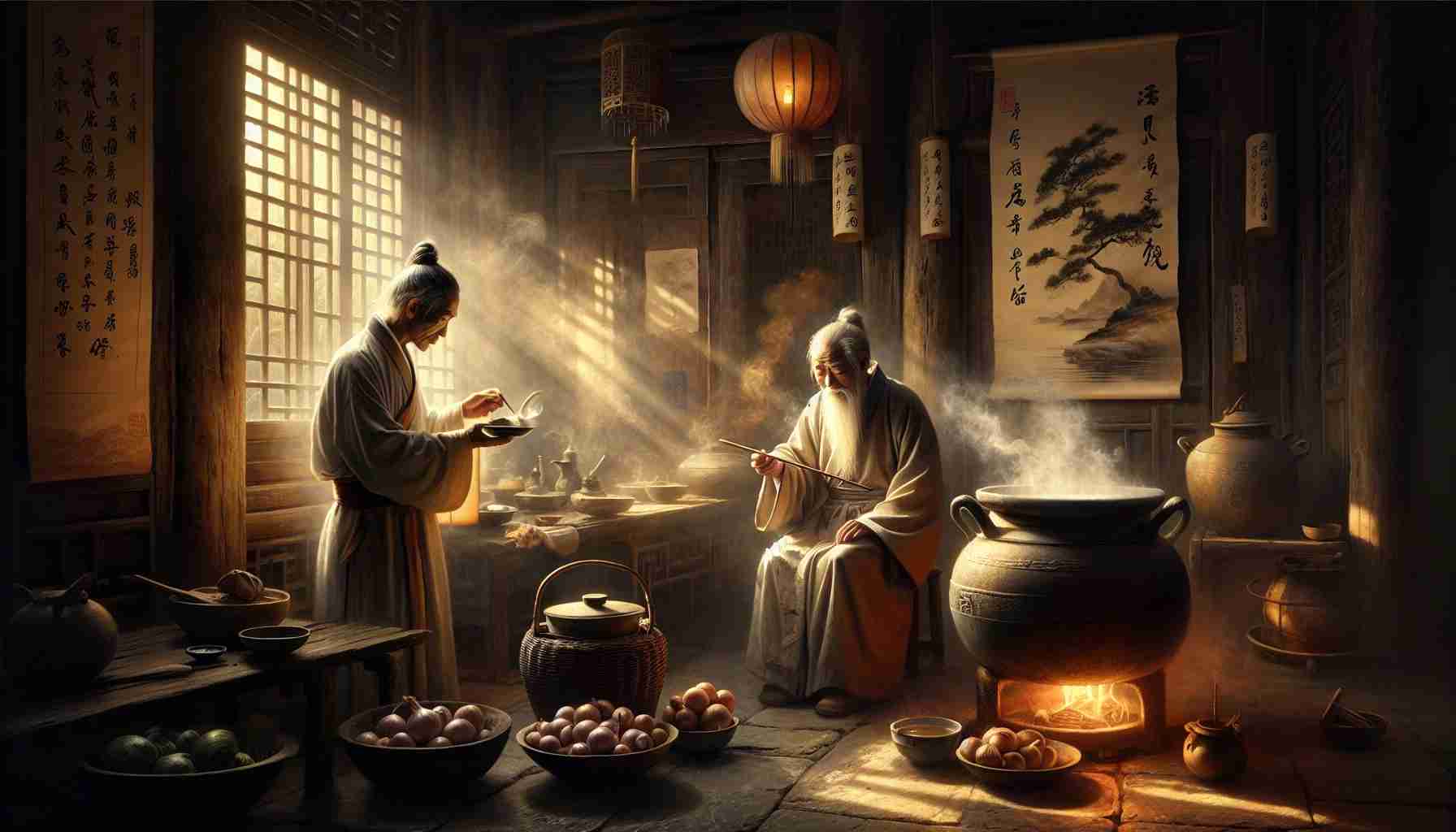

The stew was burning.
I darted forward, nearly knocking over a basket of onions. My sleeves flapped as I fanned the flames under the pot.
Grandfather chuckled beside me, gently moving my hands away. “Wu Wei,” he said softly.
“Wu... what?” I replied, breathless.
“Wu Wei,” he said again, placing a lid back on the steaming pot. “It means ‘non-action,’ but not doing nothing. It’s doing without forcing.”
I huffed. “But the stew was burning.”
He stirred the pot slowly. “Did the fire need more wood?”
“No…”
“Did the stew need stirring?”
I shook my head.
“Then maybe the stew needed less you,” he said with a wink.
I crossed my arms. Grandfather was the village cook, known far and wide. People said he could make magic with potatoes and soybeans, turning simple food into something worth walking miles for. He always said, “The secret is not the fingers, but the flow.”
That morning, he agreed to teach me the “Tao of Cooking,” which sounded exciting. I thought I'd learn secret spices or shapes to cut turnips. Instead, he had me peeling garlic for an hour and told me five stories about clouds and rivers.
By afternoon, I was frustrated. “Grandfather, I just want to learn how to cook like you.”
“And you shall,” he said. “But first, you must learn how not to cook.”
“What does that even mean?”
He smiled. “Come. The peppers are ready.”
We picked fresh green peppers from the garden. As I reached out to grab a large one, he stopped me. “Feel them first. Let the right one come to you.”
I raised an eyebrow but did as he said. I touched a few. Some were soft, others too small. Then I found one that seemed just right—firm, bright, and smooth. I held it up.
“Ah,” Grandfather said. “That is Tao.”
We returned to the kitchen, and he began to show me how ingredients flow together without too much thinking. “Watch how the garlic meets the oil,” he said. “Don’t rush them. Let them know one another.”
He never forced a stir—everything he did was slow, gentle, and simple. By evening, the stew was done. I dipped a spoon and tried it.
It was delicious.
I looked at him in surprise. “You didn’t do anything special!”
He nodded. “Exactly.”
We sat by the fire, bellies full. I thought about the day—my rushing, my forcing, and how everything became better when I simply allowed it to happen.
“Grandfather,” I said quietly, “I think I understand. Sometimes, trying too hard only gets in the way.”
“Yes,” he said, closing his eyes. “Freedom, in cooking and life, comes not from doing more, but from doing just enough. That is Wu Wei.”
That night, I lay in bed and dreamed of rivers that never pushed, winds that never tried to blow, and stews that knew just when to be ready.
I didn’t understand everything yet, but I had taken the first step.
And that was enough.
The stew was burning.
I darted forward, nearly knocking over a basket of onions. My sleeves flapped as I fanned the flames under the pot.
Grandfather chuckled beside me, gently moving my hands away. “Wu Wei,” he said softly.
“Wu... what?” I replied, breathless.
“Wu Wei,” he said again, placing a lid back on the steaming pot. “It means ‘non-action,’ but not doing nothing. It’s doing without forcing.”
I huffed. “But the stew was burning.”
He stirred the pot slowly. “Did the fire need more wood?”
“No…”
“Did the stew need stirring?”
I shook my head.
“Then maybe the stew needed less you,” he said with a wink.
I crossed my arms. Grandfather was the village cook, known far and wide. People said he could make magic with potatoes and soybeans, turning simple food into something worth walking miles for. He always said, “The secret is not the fingers, but the flow.”
That morning, he agreed to teach me the “Tao of Cooking,” which sounded exciting. I thought I'd learn secret spices or shapes to cut turnips. Instead, he had me peeling garlic for an hour and told me five stories about clouds and rivers.
By afternoon, I was frustrated. “Grandfather, I just want to learn how to cook like you.”
“And you shall,” he said. “But first, you must learn how not to cook.”
“What does that even mean?”
He smiled. “Come. The peppers are ready.”
We picked fresh green peppers from the garden. As I reached out to grab a large one, he stopped me. “Feel them first. Let the right one come to you.”
I raised an eyebrow but did as he said. I touched a few. Some were soft, others too small. Then I found one that seemed just right—firm, bright, and smooth. I held it up.
“Ah,” Grandfather said. “That is Tao.”
We returned to the kitchen, and he began to show me how ingredients flow together without too much thinking. “Watch how the garlic meets the oil,” he said. “Don’t rush them. Let them know one another.”
He never forced a stir—everything he did was slow, gentle, and simple. By evening, the stew was done. I dipped a spoon and tried it.
It was delicious.
I looked at him in surprise. “You didn’t do anything special!”
He nodded. “Exactly.”
We sat by the fire, bellies full. I thought about the day—my rushing, my forcing, and how everything became better when I simply allowed it to happen.
“Grandfather,” I said quietly, “I think I understand. Sometimes, trying too hard only gets in the way.”
“Yes,” he said, closing his eyes. “Freedom, in cooking and life, comes not from doing more, but from doing just enough. That is Wu Wei.”
That night, I lay in bed and dreamed of rivers that never pushed, winds that never tried to blow, and stews that knew just when to be ready.
I didn’t understand everything yet, but I had taken the first step.
And that was enough.